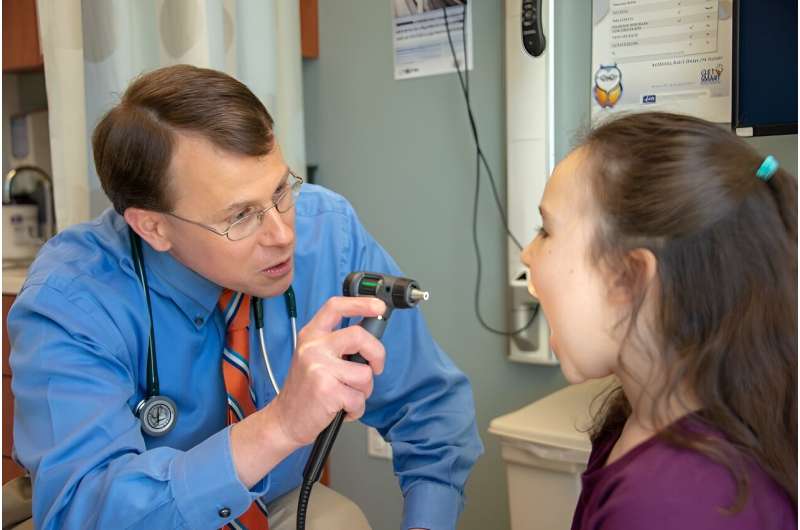This article has been reviewed according to Science X's editorial process and policies. Editors have highlighted the following attributes while ensuring the content's credibility:
fact-checked
trusted source
proofread
Why whooping cough now? Resurgence of pertussis is relative, says expert

Pertussis, or whooping cough, is on the rise as we head into the new school year.
That's compared to the last few years, when incidence was low compared to the years before the COVID-19 pandemic, but, as Dr. Timothy Lishnak, assistant professor of family medicine in the UConn School Medicine points out, it's now approaching levels seen pre-pandemic, according to the Centers for Disease Control and Prevention.
"It's considered an endemic virus, meaning we've been coexisting with it for quite some time, as opposed to COVID, which was an epidemic virus, new on the scene," Lishnak says. "And as we start to get people back into contained areas and getting back into school and other facets of life, you see this spread because it's spread by breathing out and breathing in the virus. So that's one of the mechanisms that it starts to increase."
Though highly contagious, most people with mature immune systems will recover fully in a matter of weeks, and often sooner, particularly if they're current with their recommended vaccinations. The most vulnerable to serious illness from pertussis are the very young, who haven't been vaccinated or developed their own immunity yet.
"It's the babies that don't have at least some immunity, and so what we've been doing is targeting moms during pregnancy," Lishnak says. "For many years now, it's been a recommendation that moms, as they get into the later part of their pregnancy, their third trimester, they receive a booster vaccine. That is more intended to protect their babies at birth, to give them some protection."
He says about 1 in 3 newborns who catch pertussis end up hospitalized.
The Centers' for Disease Control and Prevention recommendations on childhood immunizations include doses of DTaP (diphtheria, tetanus, pertussis) at 2, 4, and 6 months, with additional boosters at 15 to 18 months and 4 to 6 years.
An overall downward trend in vaccination compliance in recent years is a likely contributing factor to whooping cough's comeback, as is the case with the uptick in measles this past year relative to the trends of the last several decades.
Because it generally starts with symptoms like runny nose, sore throat, congestion, or fever, it can take up to a week for pertussis to distinguish itself from the common cold or other ailments such as flu, COVID-19, RSV, bronchitis, sinus infection, or hay fever.
People are contagious from the start of symptoms and for approximately two weeks after the start of coughing. The cough can feature severe coughing fits and the sudden and audible inhaling that gives "whooping cough" its name.
"It's that cough that can linger for weeks and weeks and weeks, and this is one area where treatment can be helpful," Lishnak says. "If we recognize this as whooping cough, we treat it. What we're doing is we're reducing the potential severity and the potential to spread the disease."
Pertussis is a bacterial infection, treatable with antibiotics. Physicians can test for it, and when the suspicion is strong enough, they often start the patient on antibiotics without waiting for lab results. This can reduce the risks of severe illness, complications, and spread of the illness.
When symptoms appear, the standard recommendations apply: stay home, wash hands frequently, avoid close contact with others, hydrate, rest, and use over-the-counter remedies like acetaminophen to reduce fevers.
"I've found over the years that the most useful tool in my armamentarium, besides rest and fluids, is nasal saline, which helps with a lot of things, including to help clear out a lot of congestion, which then helps to reduce the cough as well," Lishnak says.
Children should stay out of school until they are fever-free without the aid of medication for at least 24 hours and their other symptoms start to improve, he advises. Wearing a mask until symptoms are entirely gone will help prevent the spread of what's left of their illness to their classmates and teachers.
The time to call the doctor is when fever in children persists for more than three days. If children have trouble breathing or speaking, that's an urgent situation.
With the exception of pertussis in infants, Lishnak says, among the highly contagious respiratory illnesses, pertussis is still on the relatively low end of the spectrum of worry.
"We're seeing the uptick right now, and it gets a lot of publicity, but really, we still haven't gotten to where we were before the pandemic, and we probably weren't talking about it at that point, even though the levels overall were higher," he says. "We do know a lot of people will get pertussis and won't really present with many symptoms at all."
And it's another example of prevention, with the best weapon in the fight against pertussis being one that's deployed well before the battle even starts.
"When I am likely to have a conversation with patients about pertussis, it's usually when talking about the vaccine and why the vaccine is recommended, and we kind of start it by talking about vaccine hesitancy and embracing vaccines, particularly as a means to protect the most vulnerable, newborns," Lishnak says.
"The concept of vaccines is, it's not 100%, it doesn't prevent you from getting the illness. The goal is to try to minimize the severity and the complications. It's to prevent hospitalizations. It's to prevent death."





















